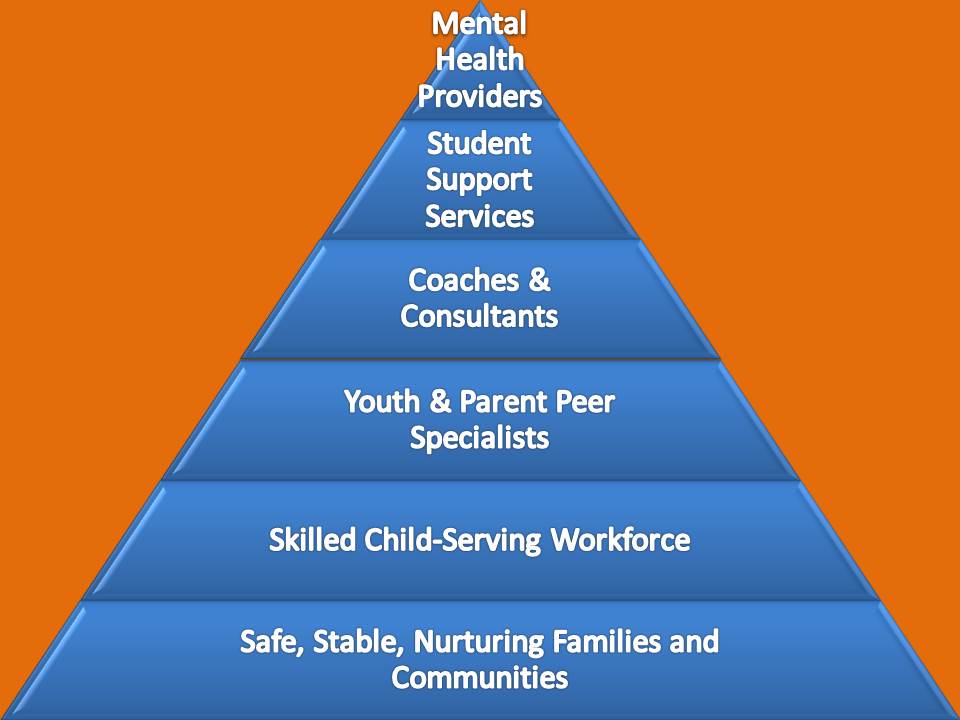The Public Health Triangle
A more traditional approach to addressing children's mental health primarily focuses on increasing the number of mental health clinicians, developing clinicians' skills, and expanding children and families' access to evidence-based mental health therapies. A public health approach remains committed to these important goals while also enlarging the vision to include supports and services that invest pro-actively in children and families' social and emotional well-being.
Much like other areas across the country, Wisconsin does not have the mental health workforce to satisfy children and families' need for therapies, psychological evaluations, psychiatric services, etc. For those families who do access services, there is no systematic data on what types of therapies or interventions are being used in Wisconsin and how well they work. Given these factors, the OCMH wants to both reduce the need for mental health services (by building the bottom of the pyramid), while also supporting the development of the right treatments, for the right children at the right time (the top of the pyramid).
The public health approach focuses on multiple tiers of supports and services as described below.

Safe, Stable, Nurturing Families and Communities: The foundation of the pyramid identifies the most significant impact on the lives of children: the presence of safe, stable and nurturing parents or other caregivers. Research shows that stressors within the family such as unaddressed parental mental illness, addiction, or domestic violence can have profound and lasting consequences on a child’s physical and mental health. Any approach to bolster children’s mental health and social development needs to consider how best to support, educate, and advocate for parents. In addition, a complete public health approach to children’s mental health must account for where and under what conditions children and families live. Research shows that the community a child grows up in can affect his or her mental and physical health.
Skilled Child-Serving Workforce: The second layer of influence identifies any adult who touch the life of a child which includes, but is not limited to, early child care workers, teachers, after school services, coaches, members of civic organizations, community centers, and faith communities -- people who have the power to positively influence a child's future well-being. The research on child development shows that having even one safe, stable and sensitive adult in a child’s life can help make the difference between a child who is resilient and one whose life trajectory is far less hopeful.
Youth and Parent Peer Specialists: The third tier identifies Parent Peer Specialists (PPS), a relatively new resource for families. A PPS is a parent or caregiver of a child who has mental, emotional, or behavioral issues and who is specifically trained to provide information, resources and support to other parents. This addition to the behavioral health workforce offers families and young people peer-to-peer support that may serve as an enhancement to traditional services or may be used as a stand-alone support.
Organizational Coaches and Mental Health Consultants: The fourth tier recognizes that a one hour, or even one day, training directed at increasing skills or "shifting perspectives" is often a lost investment without the addition of regular, direct, on-the-ground guidance. Implementation science identifies coaching as one of the most effective ways to change practices in the workforce. Thus, OCMH sees an important role for coaches and consultants who can help translate insights from research and evidence-based practices into changes in the home, early educational setting, classroom, clinics, and public-serving systems.
Student Support Services: Schools, the fifth tier, are in a prime position to see the effects of students’ social and emotional struggles. Raising awareness of a public health approach to children's social and emotional well-being may bring more support to schools who are currently short on school psychologists, counselors, social workers and nurses.
Mental health providers: The tip of the pyramid brings us back to the direct mental health clinical interventions referenced earlier.